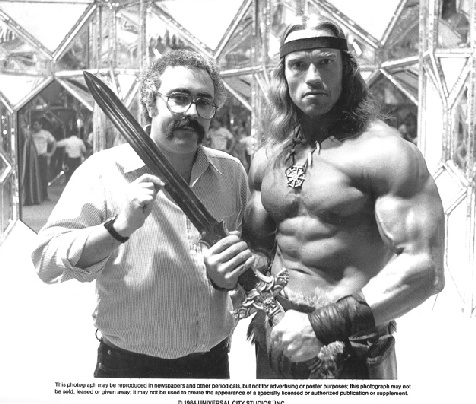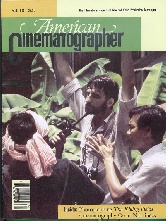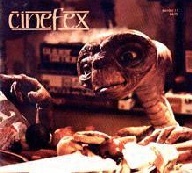Paul M. Sammon Interview
| What is BR? |
| News & Views |
| The FAQ |
| Encyclopedia |
| Quotes |
| People |
| Locations |
| Scripts |
| Analysis |
| Fan-tastic |
| BR Fun |
| BR Game |
| BR Magazine |
| BR Comic |
| Downloads |
| Collectibles |
| Related |
| Links |
| Site Info |
| Search Site |
BRmovie.com is the Home of Blade Runner - the current Blade Runner FAQ, news, resources, links, quotes, scripts and everything else Blade Runner.

![]()
Blade Runner
Buy this Mini Poster at AllPosters.com
|
Any
Comments?
Please e-mail the Webmaster |
| Want the DVD? Or the BR Game? Don't know which books or music to get? Maybe you'd like a Deckard action figure? Make sure you check the BR Related section for all your BR choices. |
|
N: Paul, thank you very much for talking with me about Blade Runner and Future Noir - our favourite movie and your wonderful book that besides being a fascinating read, actually enhances the viewing of Blade Runner. Take us back to the beginning: please introduce us to the Paul M. Sammon circa 1981. PS: Which one? The personal Paul or the professional Paul M.? They're two entirely different people, you know (laughs). Let's start with my public persona. 1981 was an exciting time for me. I'd spent the Seventies breaking into film and writing, which are the dual careers I've somehow managed to maintain since then, and by the early 1980's I'd gained a fairly secure toehold in both professions. I then spent the rest of that decade hopping upwards, from perch to perch. So by 1981, I'd already earned some minor name recognition. Particularly in film journalism, and mainly because I was prolific. I'd also been lucky enough to lay the foundations of the style I still depend on today. Yet the majority of the other literary work I produced during that period, which was more mainstream, was also, in hindsight, pretty ephemeral. By that I mean that, well, there seems to be very few people today who recall that, during the late 70's and early 80's, the "Paul M. Sammon" byline was regularly appearing in a fairly diverse variety of publications. I was writing for The Los Angeles Times, The American Cinematographer, Omni, Muscle and Fitness, Marvel Comics Special Editions, Seacoast, Rolling Stone, etc., etc., etc. A whole spectrum of publications. And I was examining topics that touched on everything. But that's my nature; I'm a living definition of the term "eclectic."
For instance, one month I'd write about technologies utilizing precisely focused laser beams to restore Renaissance art - by literally vaporizing the grime that had accreted on the surface of canvasses without damaging the paintings beneath - to subjects like the Islamic culture of Mindanao, the southernmost island of the Philippines, and how that culture was impacting on the rest of the country, which is Catholic. All of those pieces seem forgotten today. On the other hand, I'm REALLY glad most people don't know that I wrote pornographic novels in the early 1970's, to support myself through college (laughs). N: They do now! (laughs) PS: Anyway, the earliest professional writing I did which
seems to have possessed the longest shelf life is the film journalism
I cranked out during that period. It's strange, but I still get
complimented by That pretty well covers the journalism I did circa 1982. As for my other career, the film work I've done… well, by 1981, I was working in Universal Picture's marketing department; producing and directing short promotional films, helping to organize ad campaigns, doing electronic press kits for Universal's ad/pub department. Plus, I was traveling to dozens of science fiction, fantasy, horror, comic book and Star Trek conventions, solely to publicize Universal genre films. I then spent the rest of the 80's broadening my marketing expertise and working my way up the corporate ladder. That initially began at Universal, as I've said. Then I worked for a variety of other studios - MGM, the De Laurentiis Entertainment Group, Disney, Orion Pictures. Eventually, I became a Vice President of Special Promotions. That was a studio position I could easily have capitalized on, had I chosen to continue wriggling through the corporate subculture. But by the early 1990's I'd realized I didn't want to be a "suit" anymore. For one thing, nothing kills a true love of film faster than working within the studios which produce them. And I'd seen far too many men and women who'd spent their lives working within studios drop dead of heart attacks or strokes shortly after their retirement. So I pulled away from that system, and devoted my time to independent film and television production. One result of that decision was a little indie feature I wrote, produced and directed - it was an E.T. parody called P.P. The Planetary Pal - as well as three Japanese television series I coproduced during the early 1990's. Which, unfortunately, is exactly when Japan's bubble economy burst. I've also always been gadget-obsessed, so when the first wave of computer-generated effects hit Hollywood, I did a few shows as a CGI Supervisor. Then I finally decided that, of all the different areas I'd been exploring, my favorite thing was simply working on a film set. In any number of positions. Still photographer, publicist, effects supervisor, 2nd unit director, producer, writer, whatever.
|


 perfect strangers about work I published decades ago.Folks will
come up to me during a book signing, or while I'm working on a film,
and say, "Hey, I read that article you did for American
Cinematographer back in 1984 on The Killing Fields. Nice
job!" (laughs) Or someone else will tell me, "Remember
that series of pieces you did on the making of Conan The Barbarian
for Cinefantastique in 1981 and '82?" The Cinefex
website also recently posted an article I wrote for them in 1982,
titled
perfect strangers about work I published decades ago.Folks will
come up to me during a book signing, or while I'm working on a film,
and say, "Hey, I read that article you did for American
Cinematographer back in 1984 on The Killing Fields. Nice
job!" (laughs) Or someone else will tell me, "Remember
that series of pieces you did on the making of Conan The Barbarian
for Cinefantastique in 1981 and '82?" The Cinefex
website also recently posted an article I wrote for them in 1982,
titled "Turn On Your Heartlight: The Making of E.T." Which
means that my early work is now reaching a new generation through
an entirely different medium. So I guess that the movie articles
and film histories I was churning out back in the early 80's, the
ones concerning motion pictures I passionately cared about, struck
some deeply personal chords inside my readers as well. Apparently,
they still do. For which I'm very grateful.
"Turn On Your Heartlight: The Making of E.T." Which
means that my early work is now reaching a new generation through
an entirely different medium. So I guess that the movie articles
and film histories I was churning out back in the early 80's, the
ones concerning motion pictures I passionately cared about, struck
some deeply personal chords inside my readers as well. Apparently,
they still do. For which I'm very grateful.